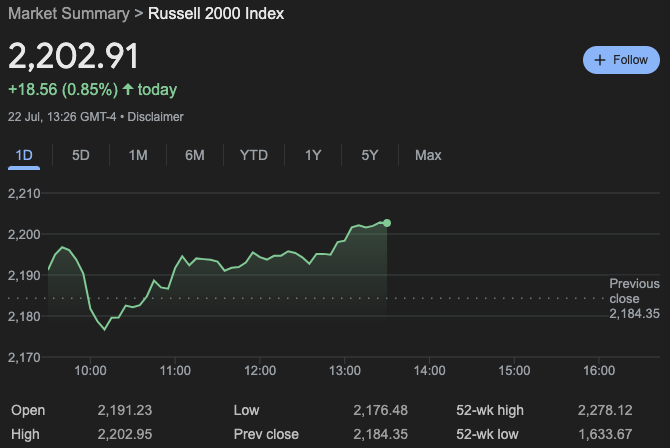On July 22, during an interview on CNBC’s “Squawk on the Street”, Tom Lee, co-founder and head of research at independent financial research boutique Fundstrat Global Advisors, shared his insights on the current U.S. stock market dynamics, focusing on small-cap stocks, the potential impacts of political shifts, and the economic outlook.
Short-term vs. Long-term Influences:
- Political News: In the short term, Tom Lee emphasized the importance of political developments. He explained that the market’s sensitivity to the outcomes of presidential and congressional elections affects sector performance. Lee noted that shifts toward a Trump administration historically benefited small caps, industrials, and financials.
- Economic News: Lee highlighted that long-term trends are shaped by economic fundamentals. He stressed that economic factors would significantly impact market performance as the year progresses.
Small-Cap Stocks and Federal Reserve Policies:
- Small-Cap Sensitivity: According to Lee, small-cap stocks are highly responsive to Federal Reserve rate cuts. He anticipates a significant rally in small caps, similar to the one seen between October and December 2023, where the market rallied nearly 30%. Lee predicts a potential 40% increase by the end of the summer due to oversold conditions and short positioning in the Russell 2000 index.
- Economic Environment: Lee emphasized that the expectation of Federal Reserve rate cuts supports his bullish outlook on small caps. He argued that the market’s anticipation of these cuts, particularly given the current oversold status of small caps, will drive significant gains.
Sector Performance and Political Impacts:
- Tech Stocks: While tech giants like Nvidia, Tesla, Microsoft, Apple, and Meta have shown strong performance, Lee believes their day-to-day movements might be more influenced by market noise than by political outcomes. He noted that the tech sector’s recent performance might not be directly tied to political shifts, such as a potential Democratic victory.
- Trump Trade: Lee pointed out that the so-called “Trump trade” is losing momentum. He mentioned indicators such as the underperformance of the Russell 2000, weaker Bitcoin prices, and declines in financial and energy stocks as evidence of the fading influence of policies associated with the Trump administration.
Inflation Outlook:
- Deflationary Trends: Lee maintains a long-standing optimism about deflation. He expects inflation to fall sharply due to a recession in durable goods, including housing and autos, which comprise a significant portion of the Consumer Price Index (CPI) basket.
- Federal Reserve’s Role: Lee argued that the Federal Reserve needs to cut rates to restore confidence. He anticipates that the urgency for rate cuts will grow, given the lack of new drivers for inflation. Lee predicts that inflation will likely surprise on the downside.
Energy Sector Analysis:
- Near-term Challenges: Lee is cautious about the energy sector in the short term. He noted that low oil prices and potential drilling activities under a Trump administration could exert downward pressure on oil prices, making energy stocks less attractive in the near term.
- Long-term Potential: Despite near-term challenges, Lee believes that energy stocks present a great investment opportunity over the next 3 to 5 years. However, he advises against overweighting energy stocks for the remainder of the year due to current market conditions.
According to data from Google Finance, as of 1:42 p.m. EDT (i.e. 5:42 p.m. UTC) on July 22, the Russel 2000 Index stands at 2,209.91, up 0.85% on the day and up 9.44% in the year-to-date period.

Featured Image via Pixabay









